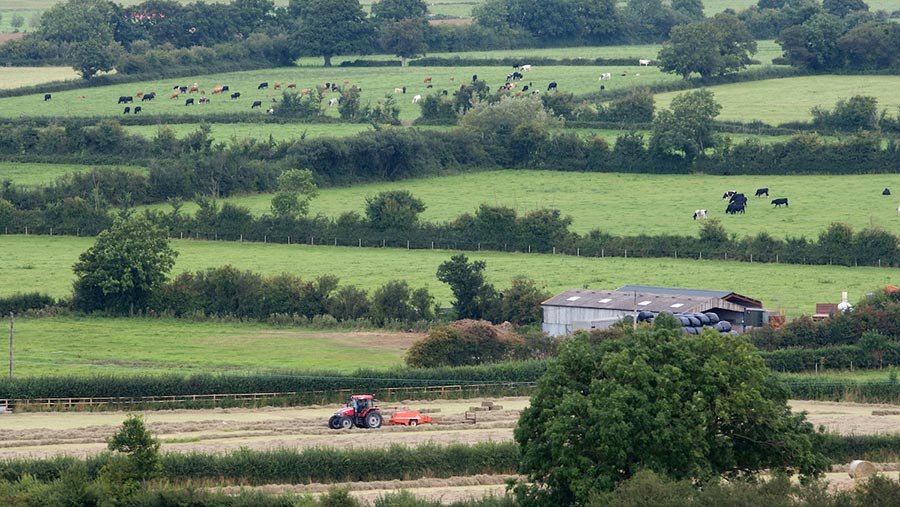Better opportunities for tenant farmers to access Defra’s emerging environmental and productivity schemes, plus a revamp of “outdated” tenancy legislation, are among the key recommendations from the Tenancy Working Group.
Launched in February of this year, the group was chaired by Conservative peer Baroness Kate Rock, supported by eight industry experts, to help government formulate a better post-Brexit support policy.
With more than 60% of farmland in England covered by some form of tenancy arrangement, its remit was primarily to ensure that tenants can participate fully in the emerging “public money for public goods” schemes.
See also: Find all our tenancy and rent advice in one place
But it went further, with the experts asked to consider how best to foster positive, long-term relationships between tenants and landlords, and to seek ways to minimise any loss of land from the tenanted sector.
The group has now published its 128-page review, containing 70 detailed recommendations.
Top of the list is the demand that “tenants should not need landlord consent to enter tenanted land into [Environmental Land Management (ELM) and productivity] schemes, and landlords should not be allowed to enter tenanted land into schemes unilaterally”.
This should certainly apply when the length of the scheme commitment is no longer than the length of the tenancy remaining, it says.
And where there is a permanent land use change – such as tree planting or rewilding – then landlords should enter such schemes “only with the consent of the tenant”.
What the report suggests
Immediate recommendations
- All Environmental Land Management and productivity schemes must be accessible and open to tenant farmers
- Tenants with Agricultural Holdings Act 1986 agreements should be allowed to enter multiannual schemes
- Defra should allow joint applications for productivity schemes, fixed equipment grants and woodland schemes
- Treasury and Defra should provide specific incentives to improve the infrastructure on tenanted holdings
- Defra should incentivise landlords to offer tenancies to new entrants
- A land occupation directorate should be set up within Defra to shine a light on tenancy issues
Long-term recommendations
- Defra should incentivise collaboration between landlords and tenants
- Legislative changes are needed to help tenants diversify and grant access to arbitration for FBT tenants
- The Law Commission should update tenancy legislation
- A consultation on tenancy reform should take place in 2023
- Licences for land agents should be tightened to improve behaviour
- A tenant farmer commissioner should be appointed to “tenant-proof” future policies
- Tax changes should encourage landlords to let more land for longer
Collaboration
There is also a focus on the way landlords and tenants currently collaborate, and how farm business tenancies (FBTs) operate for both parties.
“Tenant farmers see themselves as playing an important role in providing food for the nation and actively delivering environmental outcomes,” says the report.
“With these important objectives in mind, there should be few barriers for collaboration and flexible, long-term agreements.
“However, we found that an open and collaborative approach between tenants and landlords is sadly not the norm, and that FBTs are often used off the shelf, without the flexibility that they offer.”
As such, the report sets out a plan to improve the functionality of FBTs, and calls for a consultation on tenancy reform in 2023.
It also suggests a review of tax treatment of landlords, to encourage them to let land for longer.
For example, by limiting inheritance tax relief and business property relief to those letting land for eight years or more.
Responding to the review, the NFU stressed the importance of landlords and tenants working together “as equal partners”.
“It is important that agricultural land in the tenanted sector is protected and any loss minimised by ensuring that the Environmental Land Management scheme is accessible and relevant to both tenants and landlords,” said NFU tenants forum chairman Chris Cardell.
“The NFU agrees that county council farm estates should be a key entry point for next-generation farmers.
“The report is also right to urge Defra and regulators to ‘tenant-proof’ their schemes, policies and processes, ensuring they are a benefit to all farmers.”
The Country Land and Business Association (CLA) described the report as a “useful addition to the debate” about how landowners and tenants can take advantage of the opportunities afforded by new Defra schemes.
“Proactive collaboration between both parties will always achieve the best outcome,” said CLA president Mark Tufnell.
Government action
The government says it will publish a formal response to the review in due course, though Defra secretary Ranil Jayawardena said the review set out the importance of having a thriving tenanted sector to deliver growth and an improved environment.
“As we look at how we best deliver our environmental schemes, we will make sure that the needs of tenant farmers remain central to our plans.”
However, Tenant Farmers Association (TFA) chairman Mark Coulman issued a word of warning.
“As with all reports of this nature, there is a danger that its recommendations will be quickly forgotten – a risk that will have been heightened by the fact that it was commissioned by a previous Defra secretary of state [George Eustice],” he said.
TFA’s reaction to the report
The TFA has endorsed the report, with national chairman Mark Coulman describing it as “easily the best independent review of the tenanted sector of agriculture I have read”.
“The recommendations around changes to taxation, legislation, the design of new government financial assistance schemes, and the regulation of agents are vital to promote collaboration within the sector,” he said.
The TFA chairman is also encouraged by the focus on farm business tenancies (FBTs).
“There is much within the report that agrees with and reflects the TFA’s analysis that FBTs are routinely too short, too restrictive and of considerably more benefit to the landlords than tenants.”
He therefore welcomed the report’s challenge to the way landlords’ agents operate, blaming them for a “lack of collegiality and lack of accountability.
“There is a role for the proposed tenant farmer commissioner or ombudsman to assist with this,” he said.
Mr Coulman also pointed to two other roles for a new tenant farmer commissioner – to ensure that new government policy for agriculture is “tenant proofed”, and to improve the way disputes get resolved.
“Too much government policy for agriculture is designed with the false assumption that all farmers are owner occupiers,” said Mr Coulman.
“Often, it takes some time for the penny to drop that things play out differently for tenant farmers.”
A tenant farmer commissioner could have significant benefit in helping with these issues, he added.
CLA’s reaction to the report
The CLA has expressed some reservations about the report, saying it shows how much work Defra still has to do to roll out Environmental Land Management in a way that is attractive and workable for landowner and tenant alike.
CLA president Mark Tufnell said: “We are concerned, however, that the recommendations for tenancy reform may damage confidence in long-term letting until all matters are resolved and the way ahead is clear.
“Removing Agricultural Property Relief for shorter tenancies of less than eight years, a new provision for farm business tenancy [FBT] tenants to go to arbitration to change agreements, and a tenant farmer commissioner all could constitute barriers to the flexibility that free markets bring to both parties.”
Mr Tufnell also rejected some of the comments from the Tenant Farmers Association, saying that collaboration between landlords and tenants was good “for most of our members for most of the time”.
He also dismissed the notion that landlords’ agents were a problem. “Obviously the agent acts for the landlord’s best interests, but in the vast majority of cases, the best interest for the holding is to secure good tenant relations.”
On the issue of FBTs, Mr Tufnell suggested the problems of short duration were also overstated.
“Our surveys show that, for well-equipped farms with a property, the average let period is eight years. Bare land is more like four, but the majority of them just roll on from tenancy to tenancy.”
Baroness Kate Rock
Tenancy Working Group chairwoman
We all want a healthy environment, a growing rural economy, and thriving communities – and a productive agricultural tenanted sector is the key to meeting these aims.
Important to achieving this is certainty, stability, collaboration, and incentives.
However, we found that tenant farmers across England are facing an uncertain future under the burden of decreasing cashflows and increasing uncertainty over their ability to access future public funding schemes.
Tenant farmers are also impacted by restrictive clauses, low levels of collaboration with landlords, and persistently short farm business tenancy agreements with an average of less than four years.
When looked at with policy uncertainty, rent requirements and reducing cashflow, thousands of farming families are facing financial hardships.
Our review provides a clear vision and a way forward for the tenanted sector.
We want a sector that can strengthen the nation’s food security, meet the challenges of climate change, improve nature, enhance biodiversity, and drive growth in our rural economy.
In developing our recommendations, we were careful to balance the interests of landlords and tenants, and make sure that we could enable a more collaborative landlord-tenant relationship for mutually beneficial outcomes.
We are all custodians of our land and a sustainable, resilient, and thriving tenanted sector is in the interest of the nation.












